April 13, 2017, by Kathryn Steenson
Threads of Empire: Rule & Resistance in Colonial India
Seventy years after India gained independence, our latest exhibition reveals the acts of resistance that shaped the British Empire in India.
From 13th April, the Weston Gallery, Nottingham Lakeside Arts will host an exhibition showcasing the history of tense negotiation, resistance and rebellion that lay behind the emergence of India as the ‘Jewel in the Crown’ of the British Empire.
Based on Manuscripts and Special Collections’s extensive archives on colonial India, and including some treasures generously loaned by Nottingham Castle Museum, ‘Threads of Empire’ explores the rise of the British Empire in India from 1740 into the 19th century through letters, photographs, maps, newspaper reports, original artwork, and objects.
Many of the original archival documents belonged to the first Governor-General of India, Lord William Henry Cavendish-Bentinck and have never been on public display. British presence in India began in the 17th century with the East India Company’s establishment of coastal trading bases exporting cottons, silks, calicoes and tea. Yet behind ceremonies and gifts exchanged between the East India Company and Indian princes lay dissent and distrust that eventually developed into full scale rebellion during Bentinck’s Governorship.
British rule in India always appeared stronger than it actually was. The documents show that those in charge were acutely aware of how precarious their hold was, more than a century before the Indian Independence Act came into force. They reveal the fragile terrain of British imperial power in India from the perspective of both the rulers and the ruled, such as letters from outraged Indian princes, accusing the British of deceit and duplicity. One highlight is a sabre on loan from Nottingham Castle Museum, which was taken by a British soldier as a war trophy from a defeated Indian military officer during the 1857 Indian Mutiny. Other treasures on display include a petition against outlawing sati (the practice of burning widows on their husband’s funeral pyre), signed by hundreds of Hindu inhabitants of Calcutta and presented to Bentinck in the 1820s.
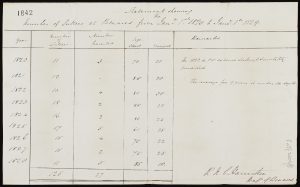
Statement showing the number of attempted and actual Suttees that took place in Benares (Varanasi) between 1820-1829 (Pw Jf 2608/5)
Also showcased is a specially-commissioned artwork inspired by the archives, created by a local textile-art collective, Infinite Threads (comprising Singing Bird Artist, Pauline Edwards and P. Chezharb). ‘Tangled Freedoms I, II & III’ creatively interprets the themes and content of the exhibition using stitched fabrics and dyes in three individual yet linked pieces of textile art. The triptych was funded by a grant from The University of Nottingham’s Pro Vice Chancellors’ Fund.
Threads of Empire: Rule and resistance in colonial India has been jointly curated by Manuscripts and Special Collections at The University of Nottingham, Dr Onni Gust from the Department of History, and Ibtisam Ahmed from the Department of Politics and International Relations. Ibtisam’s time on the project was supported by The University of Nottingham’s Institute of Asia and Pacific Studies.
The exhibition will be held at the Weston Gallery, Nottingham Lakeside Arts, University Park, Nottingham NG7 2RD from Thursday 13 April 2017 – Sunday 20 August 2017. Admission is free.
As part of this, we’re holding three lunchtime talks and two special events. The venue for all of them is the Djanogly Theatre, Nottingham Lakeside Arts, University Park Campus, Nottingham, NG7 2RD. For tickets please contact Lakeside’s Box Office, and their phone number is 0115 846 7777.
- 20 April 2017, 1-2pm: The ‘Thin White Line’: European soldiers in colonial India
Dr Erica Wald explores the professional and daily lives of the European rank-and-file in India in the 19th century. - 18 May 2017, 1-2pm: Clothing the Other: Fashion and the British Empire in India
Ibtisam Ahmed looks at the role of clothing in defining and enforcing British rule in India. - 6 June 2017, 1-2pm: ‘Singing the Lord’s song in a strange land’: 19th century debates over British rule in India
Dr Onni Gust examines early debates about the rights and wrongs of British conquest and rule in India. - 13 June 2017, 7.30pm: Dance/Spoken Word ‘Echoes’ and ‘I Imagine’ by Aakash Odedra Company
£15 (£12 concs), £9 restricted view. Suitable for 14 years and upwards. ‘Echoes’ is an exhilarating, high-octane Kathak dance experience which explores relationships with our ancestors. Aakash combines beautiful choreography with powerful spoken word performance. ‘I Imagine’ is Aakash’s exploration of dance-theatre by embodying three generations of migrants through masks and acting. - 17 July 2017, 7.30pm: World Cinema: The Chess Players (1977) PG (Director Satyajit Ray)
£5 (£3 concs). A seminal piece of Indian cinema, The Chess Players looks at the dynamics at play during the 1857 Rebellion, focussing on the actions of two chess-obsessed noblemen. The juxtaposition of their interest in a game of strategy with their ineffectiveness in real-world politics is a scathing commentary on elitism and classism in India as much as it is a critique of British colonial policy.
Places are limited so we recommend people book in advance with the Box Office on 0115 846 7777 or http://tickets.lakesidearts.org.uk/single/EventListing.aspx?k=268. More information is available at the website: http://www.nottingham.ac.uk/manuscriptsandspecialcollections/exhibitions/threadsempire.aspx
No comments yet, fill out a comment to be the first

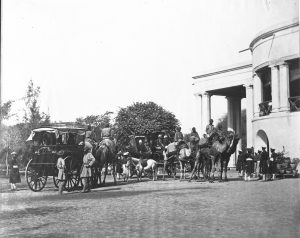
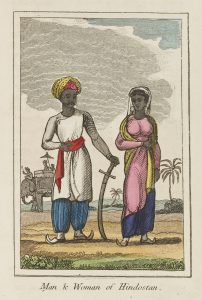
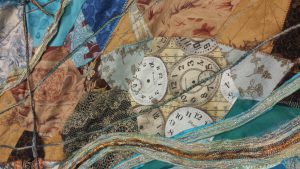
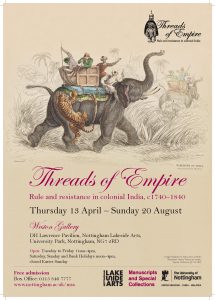
Leave a Reply